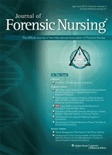
Journal of Forensic Nursing
Scope & Guideline
Unveiling the Complexities of Forensic Care
Introduction
Aims and Scopes
- Forensic Nursing Practice:
The journal emphasizes the role of forensic nurses in providing care to victims of violence and abuse, including sexual assault, domestic violence, and human trafficking. It explores best practices, ethical considerations, and the impact of trauma-informed care. - Interdisciplinary Collaboration:
Research published in the journal often highlights the importance of collaboration among healthcare providers, law enforcement, and legal professionals to improve outcomes for patients and enhance the effectiveness of forensic nursing. - Education and Training:
A significant focus is placed on the education and training of forensic nurses, including curriculum development, competency assessments, and innovative training methodologies to prepare nurses for the complexities of forensic care. - Policy and Advocacy:
The journal addresses the need for policy changes and advocacy efforts related to forensic nursing, particularly in improving access to care for marginalized populations and addressing systemic issues in the criminal justice system. - Research and Evidence-Based Practice:
The journal promotes research that contributes to the body of knowledge in forensic nursing, encouraging studies that utilize rigorous methodologies to evaluate interventions, care models, and patient outcomes.
Trending and Emerging
- Trauma-Informed Care:
An increasing number of articles focus on trauma-informed care approaches, emphasizing the importance of understanding the impact of trauma on patients and integrating this knowledge into nursing practice to provide holistic care. - Sexual and Gender-Based Violence:
This theme has gained significant attention, with a surge in research addressing the complexities of sexual violence, including the experiences of marginalized groups, the role of social media, and the implications for policy and education. - Mental Health in Forensic Settings:
There is a growing body of work focusing on mental health issues among forensic populations, particularly the experiences of incarcerated individuals and the intersection of mental health and forensic nursing. - Use of Technology in Forensic Nursing:
Emerging research explores the application of technology, such as telehealth and electronic systems, in enhancing access to forensic care and improving patient outcomes, particularly in rural or underserved areas. - Health Equity and Access to Care:
A notable trend is the focus on health equity, with research increasingly addressing barriers to care for vulnerable populations, including racial and ethnic minorities, individuals with disabilities, and those in correctional facilities.
Declining or Waning
- Traditional Forensic Nursing Roles:
There has been a noticeable decrease in papers focusing on the traditional roles of forensic nurses, such as those solely centered on evidence collection and immediate medical care in sexual assault cases, as the field evolves toward more complex, multidisciplinary approaches. - General Public Awareness Initiatives:
Research articles that explore general public awareness of forensic nursing and its significance have become less prevalent, suggesting a shift towards more specialized and nuanced topics within the field. - Historical Perspectives on Forensic Nursing:
The publication of articles that emphasize historical analyses or retrospective studies of forensic nursing practices has declined, indicating a move towards contemporary issues and future-oriented research. - Basic Skills Training for Forensic Nurses:
There is a waning focus on basic skills training and foundational content for forensic nurses, as the journal increasingly prioritizes advanced practice topics and innovative care models. - Single-Case Studies:
The journal has seen fewer publications centered on single-case studies, potentially due to a preference for broader studies that provide more generalizable findings to inform practice.
Similar Journals
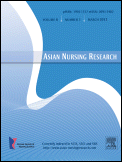
Asian Nursing Research
Empowering professionals with cutting-edge insights in nursing.Asian Nursing Research is a prestigious open access journal published by ELSEVIER SCIENCE INC, located in South Korea. Since its inception in 2007, this journal has served as an essential platform for disseminating high-quality research in the field of nursing and healthcare, boasting a notable impact factor and categorized within the top quartiles of both Q1 in Nursing (miscellaneous) and Q2 in Medicine (miscellaneous) for 2023. It holds a commendable rank of #27 out of 139 in the general nursing category, placing it in the 80th percentile according to Scopus rankings. The journal's comprehensive scope encompasses a wide range of topics relevant to nursing practice and research, thereby addressing pressing healthcare challenges and promoting evidence-based clinical practices. By offering open access since 2007, Asian Nursing Research ensures that researchers, professionals, and students have unrestricted access to valuable insights and advancements in the nursing discipline, making it a critical resource for advancing knowledge and improving patient care across Asia and beyond.

MEDICINE SCIENCE AND THE LAW
Exploring Ethical Frontiers in Medicine and LawMEDICINE SCIENCE AND THE LAW is a prestigious journal published by SAGE PUBLICATIONS INC, focused on the intersection of law, health policy, and ethical issues as they pertain to medicine. With a long-standing history dating back to 1960, this journal has become a crucial platform for scholars and professionals alike to share and disseminate research that shapes the evolving legal landscape surrounding health care practices. It holds notable positions in the academic community, ranking in the Q3 category for Health Policy and Issues, Ethics and Legal Aspects, and achieving a distinguished Q1 ranking in Law as of 2023. With rigorous peer-review standards and a commitment to publishing high-quality research, MEDICINE SCIENCE AND THE LAW is invaluable for those exploring the critical legal challenges and ethical dilemmas faced within the healthcare sector. Research contributions are vital for informing policy and practice, ensuring that the journal remains a relevant and essential resource for researchers, practitioners, and students dedicated to the intersection of law and medicine.
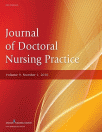
Journal of Doctoral Nursing Practice
Advancing nursing excellence through innovative research.The Journal of Doctoral Nursing Practice, published by SPRINGER PUBLISHING CO, serves as an essential platform for the dissemination of innovative research and best practices in nursing and health policy. With its ISSN 2380-9418 and E-ISSN 2380-9426, this journal is committed to advancing the field through rigorous peer-reviewed articles that contribute to both theoretical and practical advancements in doctoral nursing education and practice. Since its inception in 2016, the journal has provided a vital forum for scholarly work, currently holding a prestigious ranking of Q3 in Nursing (Miscellaneous) and Q4 in Health Policy. The journal emphasizes the significance of nursing research in influencing health policy and outcomes, making it a critical resource for researchers, practitioners, and students alike who aspire to enhance nursing practices and healthcare systems. With no Open Access option, access to its high-quality content reflects a commitment to academic rigor and integrity, ensuring that the work published is both impactful and credible.
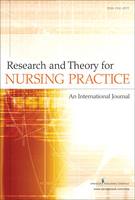
Research and Theory for Nursing Practice
Bridging theory and practice in nursing research.Research and Theory for Nursing Practice, published by SPRINGER PUBLISHING CO, is a pivotal journal in the field of nursing research and theory, dedicated to advancing the discipline through rigorous empirical investigation and theoretical exploration. With an ISSN of 1541-6577 and an E-ISSN of 1945-7286, it serves as a platform for nursing professionals, researchers, and students seeking to disseminate innovative ideas and evidence-based practices. Established in 2002, the journal continues to contribute significantly to the academic community, featuring articles that are aligned with contemporary challenges and developments in nursing practice. Although categorized as Q4 in Medicine (miscellaneous) and Q3 in Research and Theory in 2023, it holds a respected position within the nursing field, ranking #14 out of 18 in Scopus Nursing research and Theory. The journal emphasizes the importance of integrating research findings into clinical practice and is committed to fostering a meaningful dialogue among nursing scholars. Access is not open, allowing for a curated collection of high-quality research that is essential for enhancing nursing education and patient care. The journal's convergence from 2002 to 2024 showcases its enduring relevance, making it a crucial resource for those aiming to shape the future of nursing.
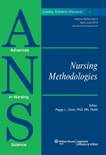
ADVANCES IN NURSING SCIENCE
Elevating Nursing Scholarship, Transforming Patient Care.Advances in Nursing Science, an esteemed journal published by Lippincott Williams & Wilkins, delves into the multifaceted realm of nursing scholarship and practice. With an ISSN of 0161-9268 and an E-ISSN of 1550-5014, this influential periodical has been fostering rigorous academic discourse since its inception in 1978, and it continues to shape the landscape of nursing research through 2024 and beyond. Recognized in the 2023 Scopus rankings as a Q2 journal in the field of Nursing (miscellaneous), it holds the impressive rank of #48 out of 139, positioning it in the 65th percentile among its peers. While it offers traditional subscription access, the journal's commitment to disseminating high-quality research makes it a vital resource for researchers, healthcare professionals, and nursing students striving to enhance their practice and academic endeavors. By addressing contemporary issues in nursing and healthcare, Advances in Nursing Science is dedicated to advancing the science of nursing and promoting excellence in patient care.
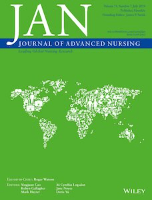
JOURNAL OF ADVANCED NURSING
Fostering excellence in nursing education and practice.JOURNAL OF ADVANCED NURSING is a premier peer-reviewed journal published by Wiley, dedicated to advancing the field of nursing and contributing to the global dialogue surrounding nursing practices and education. With an impressive impact factor, this journal is positioned in the esteemed Q1 category for miscellaneous nursing journals in 2023, reflecting its rigorous standards and the high quality of published research. The journal covers a broad range of topics within nursing, promoting innovative research and critical discourse that informs best practices and policy decisions, making it an invaluable resource for researchers, practitioners, and students alike. With its foundational years dating back to 1976, the JOURNAL OF ADVANCED NURSING continues to uphold a legacy of excellence and impact, currently ranked #7 out of 139 in the Scopus General Nursing category, placing it in the top 95th percentile of nursing journals. Although primarily subscription-based, the journal provides access options that cater to institutions and emerging researchers, ensuring that vital knowledge is disseminated widely within the nursing community.

Investigacion y Educacion en Enfermeria
Empowering healthcare through innovative education.Investigacion y Educacion en Enfermeria, published by Universidad de Antioquia, Facultad de Enfermería, stands as a pivotal open-access journal since 1983, contributing significantly to the field of nursing and healthcare education within Colombia and beyond. With its ISSN 0120-5307 and E-ISSN 2216-0280, this journal aims to foster the dissemination of high-quality research, aiming to enhance nursing practices and education aligned with a wide array of domains including Community and Home Care, Family Practice, Geriatrics, and Maternity and Midwifery. The journal's impressive performance in the 2023 Scopus rankings places it in the top quartiles in several categories, reflecting its importance and influence, particularly in Nursing and Health Sciences. By encouraging collaboration and dialogue among researchers, practitioners, and students, Investigacion y Educacion en Enfermeria aspires to serve as an essential resource for advancements in nursing education and service delivery, making vital contributions to the evolving landscape of healthcare.
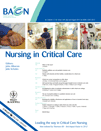
Nursing in Critical Care
Championing the evolution of nursing practices in high-stakes environments.Nursing in Critical Care is a premier journal dedicated to the advancement of knowledge and practice in the field of critical care nursing. Published by WILEY, this esteemed journal has established itself as a leader in the domain, holding a prestigious Q1 ranking in Critical Care Nursing as of 2023, and ranking as the 2nd out of 27 in its category according to Scopus, with an impressive 94th percentile. Since its inception in 1996, it has been an essential platform for disseminating cutting-edge research, evidence-based practices, and critical insights that directly impact patient outcomes in high-stakes environments. While not an Open Access journal, it offers accessible options for institutions and individuals dedicated to the continuous evolution of nursing practices in critical care settings. The journal promises to remain at the forefront of the discipline, providing invaluable resources for researchers, practitioners, and students alike who aspire to enhance their expertise and improve the standards of care within intensive health scenarios.
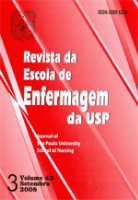
Revista da Escola de Enfermagem da USP
Elevating Global Healthcare with Scholarly InsightsRevista da Escola de Enfermagem da USP, published by UNIV SAO PAOLO, is a premier open-access journal that has been a cornerstone of nursing research since its inception in 1967. With a focus on disseminating innovative research and practices in the field of nursing, this journal has distinguished itself in the 2023 rankings by achieving Q2 in Nursing (miscellaneous) category and ranking 80 out of 139 in Scopus for General Nursing, placing it in the 42nd percentile. Accessible globally since 1996, the journal invites contributions that enhance nursing knowledge and practice, making it an invaluable resource for researchers, professionals, and students alike. Its commitment to open access ensures that vital nursing research is readily available to advance the global healthcare discourse. The journal's editorial office is located at AV Dr Eneas de Carvalho Aguiar, 419, Cerqueira Cesar, SP 05403-000, Brazil, fostering a vibrant community dedicated to improving nursing standards through scholarly engagement.
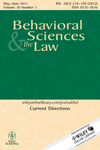
BEHAVIORAL SCIENCES & THE LAW
Transforming Legal Understanding Through Behavioral ResearchBehavioral Sciences & The Law is a premier interdisciplinary journal published by Wiley, dedicated to exploring the intricate relationships between behavioral sciences and legal systems. Established in 1983 and continuing through 2024, this journal provides a vital platform for researchers, professionals, and students in the fields of law, clinical psychology, medicine, and psychiatry. With an impressive impact factor reflected in its Q1 ranking in Law and Q3 in Clinical Psychology, Psychiatry, and Medicine, it stands out in the academic community, facilitating scholarly discourse and advancing understanding in these critical areas. While currently not following an open access model, the journal’s reach is extensive, delivering cutting-edge research and thought leadership from the United Kingdom to a global audience. Whether you are investigating the psychological dimensions of legal practice or the implications of law on behavioral health, Behavioral Sciences & The Law remains an essential resource for those committed to the intersection of these disciplines.